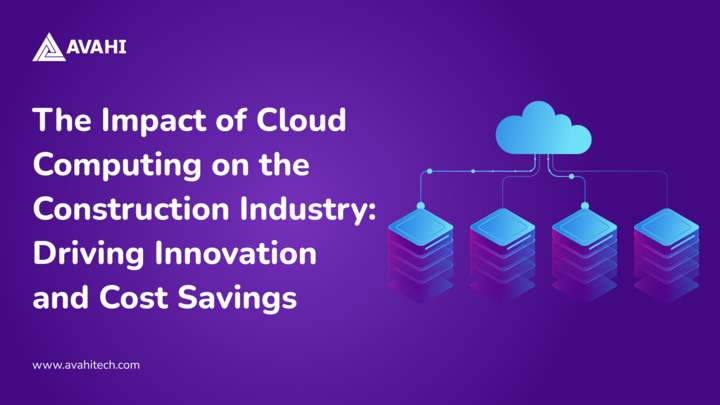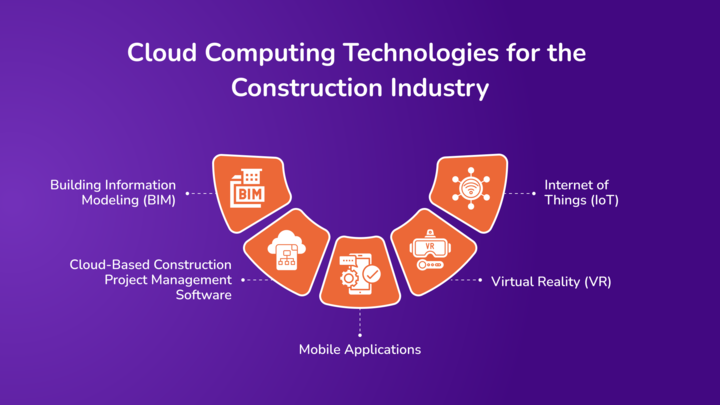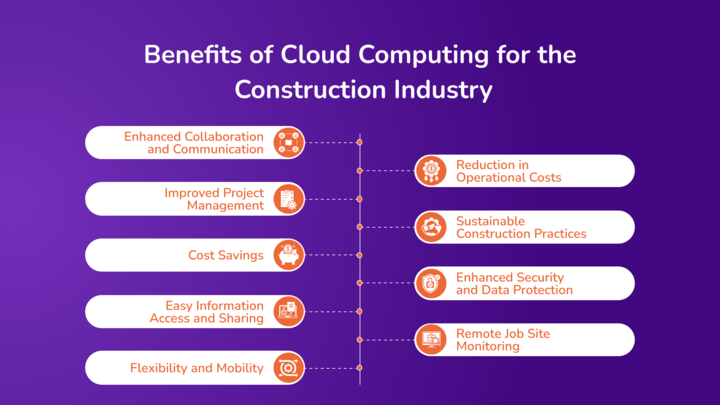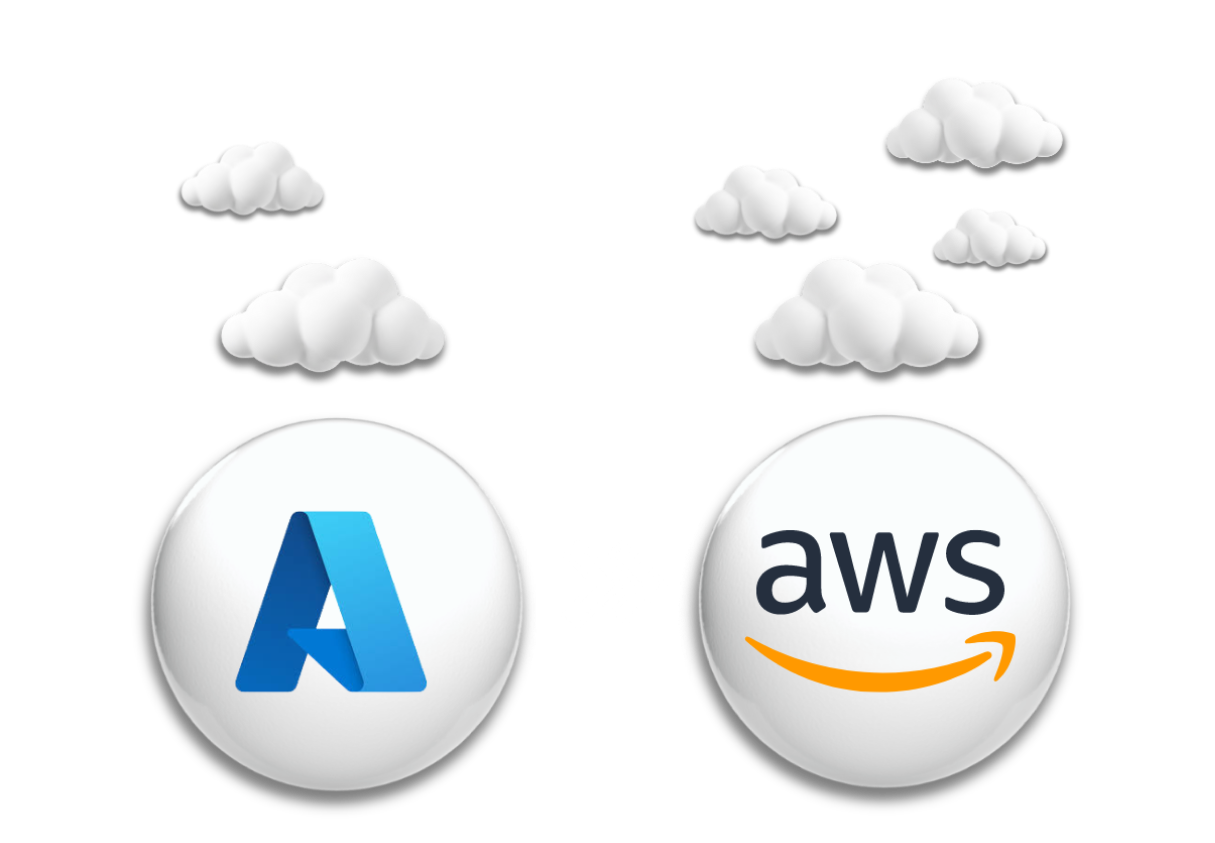The construction industry is witnessing a significant transformation driven by cloud computing technologies. Historically perceived as one of the least digitized sectors, construction is moving towards a more efficient, secure, and collaborative future.
Cloud computing has become the backbone of construction operations, enabling companies to manage projects with unprecedented precision and flexibility. This shift offers excellent advantages but also brings challenges that must be managed carefully, like:
- Internet Connectivity and Reliability: Ensuring stable internet access in remote or new construction sites to keep cloud-based services running smoothly.
- Learning Curve and Resistance to Change: Overcoming the resistance of original practices with effective training and change management strategies.
- Data Migration and Integration: Seamlessly transitioning from legacy systems to cloud-based solutions without disrupting ongoing operations.
- Infrastructure and Security Concerns: Minimizing on-site infrastructure while enhancing data security, even in remote locations.
- Cost Perception and Value Realization: Demonstrating the cost-effectiveness of cloud solutions over previous methods to encourage wider adoption.
Cloud computing in construction means more than just moving data to a virtual space; it involves how projects are conceived, planned, and executed. This blog will explore the benefits, challenges, and future trends of cloud computing in the construction industry and how it reshapes project management from start to finish.
Understanding Cloud Computing in the Construction Industry
Cloud computing is a technology that lets you store and access data and software over the internet instead of on your computer’s hard drive or local servers. In the construction industry, you can manage projects, share information, and communicate with team members regardless of location.
Types of Services in Cloud Computing
| Cloud Service | Description | Application in Construction Industry |
| Infrastructure as a Service (IaaS) | Provides fundamental computing resources like virtual servers and storage solutions. | Ideal for large-scale construction projects requiring extensive data storage and high processing power (e.g., storing blueprints, design files, and project data). |
| Platform as a Service (PaaS) | Offers a computing platform and solution stack to develop, run, and manage applications. | It provides a flexible platform for developing custom project management and collaboration tools without the need to manage the underlying infrastructure. |
| Software as a Service (SaaS) | Delivers software applications over the internet on a subscription basis. | Enables access to cloud-based project management tools from anywhere, ensuring teams stay updated in real time. |
Cloud Computing Technologies for the Construction Industry
The construction industry is transforming digitally, with cloud computing at the forefront of this change. By integrating cloud-based technologies, construction professionals can significantly enhance efficiency, collaboration, and return on investment. Here’s a closer look at some important cloud computing technologies reshaping the construction industry:
Building Information Modeling (BIM)
Building Information Modeling (BIM) facilitates effective collaboration among all stakeholders, including architects, engineers, and contractors. It allows for detailed visualization and analysis, from the structural integrity to the optimal routing of electrical conduits, ensuring everyone is aligned from the earliest design stages to construction.
- Cloud-based BIM platforms take the capabilities of BIM tools to the cloud, enabling real-time collaboration across different geographical locations.
- Stakeholders can simultaneously work on a unified model, conduct clash detections, and make coordinated decisions.
For example, Skanska, one of the world’s leading project development and construction groups, has integrated cloud-based project management tools across its global operations. These tools help manage complex projects by facilitating real-time collaboration among international teams.
Cloud-Based Construction Project Management Software
This software offers tools that allow project tracking and management from start to finish. With features like task tracking, document storage, and budget management, cloud-based project management software helps ensure that projects are delivered on time and within budget. Centralizing data and allowing for real-time updates reduces errors and enhances communication among team members, regardless of their location.
For example, Turner oversees various projects using Procore, a cloud-based construction management platform. Procore enables Turner to centralize project data, track progress, and collaborate across job sites and offices in real-time.
Mobile Applications
Cloud-based mobile applications allow construction managers and field workers to capture and report data directly from the construction site. Features like progress photo uploads, on-the-spot report generation, and real-time data sync keep the project moving forward by ensuring all stakeholders can access the latest information, enhancing decision-making and operational efficiency.
Internet of Things (IoT)
IoT technology integrates internet-connected sensors and devices into construction equipment and materials, providing real-time data that can be used for monitoring and management. This information is critical for tracking material usage, equipment status, and worker productivity. IoT enables predictive maintenance, enhances safety protocols, and improves overall project efficiency by providing insights that help preempt potential issues.
Virtual Reality (VR)
Virtual Reality is increasingly being adopted in the construction industry to visualize and simulate building designs before physical construction begins. VR allows project teams to walk through a virtual model of the project, identify potential design and structural issues, and make adjustments beforehand. This proactive approach minimizes costly changes and delays during construction, ensuring smoother project execution.
Selecting the right tools and platforms and ensuring they are secure and compliant with industry regulations will help you maximize the benefits of cloud computing in construction.
Benefits of Cloud Computing for the Construction Industry
Here’s how cloud technology benefits your work and why you should consider integrating cloud technologies into your construction projects.
Enhanced Collaboration and Communication
With cloud-based platforms, your project team can access, update, and share documents in real-time, no matter where they are. This immediate exchange of information ensures everyone has the latest updates, reducing the risk of errors and rework. Tools like instant messaging and video conferencing integrated into these platforms also improve how you communicate, making project management more efficient.
Improved Project Management
Utilizing cloud computing means all your project data—from schedules to compliance documents—is stored in one central location. This centralized data storage is accessible to all stakeholders anytime, enhancing decision-making and reducing project delays. Cloud-based project management tools also allow for better resource scheduling, task assignment, and progress tracking, keeping your projects on track and within budget.
Cost Savings
Cloud computing significantly reduces your overhead costs. You save on hardware investments and maintenance by eliminating the need for extensive on-site IT infrastructure. Furthermore, cloud services operate on a pay-as-you-go basis, meaning you only pay for the resources you use. This flexibility can lead to substantial financial savings, especially for projects with fluctuating demands.
Easy Information Access and Sharing
Cloud services ensure that essential project documents, such as blueprints and hazard assessments, are easily accessible and shared. This immediate availability is crucial for maintaining safety standards and operational efficiency on site. Cloud services also replace outdated methods like paper folders and spreadsheets, streamlining document management and ensuring you always have the most current information at your fingertips.
Flexibility and Mobility
The construction industry often encounters unpredictable situations like inclement weather or material delivery delays. Cloud computing offers the flexibility to manage these challenges effectively. With cloud services, you can access and manage your project information remotely, allowing for quick adjustments and decision-making, which is essential for keeping your project moving forward under any circumstances.
Reduction in Operational Costs
Integrating cloud-based accounting software helps streamline your financial operations, from payroll management to cash flow predictions. This reduces the time spent on administrative tasks and enhances the accuracy of your financial reporting, helping you manage your budget more effectively.
Sustainable Construction Practices
Cloud computing supports sustainable construction practices by optimizing resource use and reducing waste. It also allows for real-time energy consumption monitoring, enabling you to make informed decisions that align with your sustainability goals.
Enhanced Security and Data Protection
Cloud providers invest heavily in security, implementing robust measures such as encryption and multi-factor authentication to protect your data. Regular backups and disaster recovery plans further ensure that your project data is safe and recoverable in the event of an incident. This level of security is crucial for protecting sensitive project information and maintaining client trust.
Remote Job Site Monitoring
Cloud computing lets you view job sites remotely using drone footage or aerial photos. This capability allows for a better understanding of project progress and potential issues without being physically present on-site, saving time and enhancing project oversight.
The shift to cloud technology future-proofs your business and provides a competitive edge in the fast-evolving construction industry.
Implementation Steps for Cloud Computing in Construction Firms
Successfully adopting cloud computing requires a structured approach. Here’s a concise guide for construction firms to implement cloud technology:
Step 1:Assess Project Requirements
Evaluate each project’s specific needs—whether for project management, design collaboration, or document storage. This helps select the right cloud services for team collaboration, such as Procore or Autodesk Construction Cloud.
Step 2: Choose the Right Cloud Tools
Select cloud services that align with your goals, considering security, ease of use, scalability, and integration with existing systems.
Step 3: Onboard and Train Teams
Introduce cloud tools with comprehensive training sessions and hands-on demos, and address any concerns to ensure everyone is comfortable and can use the tools effectively.
Step 4: Integrate Cloud Solutions Gradually
Adopt a phased approach, implementing cloud processes in key areas like document management or scheduling to avoid disrupting ongoing projects.
Step 5:Communicate the Benefits to Teams
Ensure team members understand how the tools will improve collaboration, streamline tasks, and reduce paperwork, fostering acceptance and enthusiasm for the transition.
Step6: Monitor and Optimize
Continuously monitor usage, identify areas for improvement, and provide ongoing training to ensure that cloud solutions enhance project outcomes.
By following these steps, construction firms can seamlessly implement cloud computing, leading to more efficient workflows and improved project management.
Future Trends in Cloud Computing for the Construction Industry
As cloud computing continues to reshape construction, emerging technologies are driving significant progress in efficiency, safety, and cost-effectiveness. Key trends include:
-
- AI and Machine Learning (ML) Applications: The AI market in construction is projected to reach $4.5 billion by 2026, growing at a 34% CAGR. AI and ML, combined with cloud computing, optimize resource allocation, predict delays, and automate routine tasks. This improves decision-making and reduces errors.
- IoT Integration: The IoT in the construction market is expected to reach $26.5 billion by 2027 at a 16.5% CAGR. Integrated with cloud platforms, IoT sensors enable real-time monitoring of sites and equipment, improving safety and predictive maintenance while streamlining workflows.
- Augmented Reality (AR) and Virtual Reality (VR): The AR/VR market in construction is set to grow at 35% CAGR between 2021 and 2026. AR/VR technologies, supported by the cloud, enhance 3D design visualization and virtual walkthroughs, improving decision-making and reducing costly changes.
- Cloud-Based Project Management Tools: 68% of construction professionals say cloud tools improve collaboration and transparency. Cloud project management tools are evolving with AI analytics and real-time collaboration, enhancing transparency and project outcomes.
These trends highlight how cloud computing will continue to drive innovation and efficiency in the construction industry.
Discover How Avahi Can Elevate Your Cloud Experience
Avahi specializes in delivering innovative cloud solutions that address your unique business challenges. As your dedicated AWS Cloud Consulting Partner, we are committed to simplifying your cloud journey through seamless adoption, migration, and application modernization.
Our Services Include:
- Adoption and Migration: Migrate your legacy applications or workloads to AWS for enhanced reliability, scalability, and performance.
- DevOps: Unlock the power of your data with advanced analytics and machine learning capabilities.
- Cloud Staffing Services: Access top-tier talent to support and drive your initiatives, ensuring a seamless and effective cloud transformation.
Want to explore how Avahi can help you simplify, modernize, and excel in your cloud journey?






